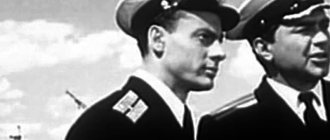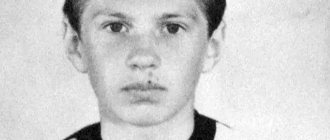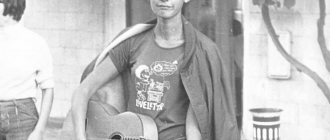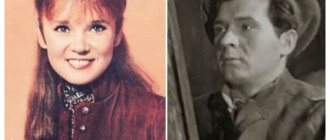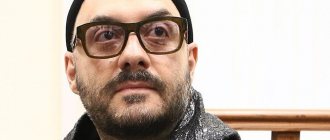Biography
Evgeny Krylatov is a Soviet and Russian composer, author of music for almost 200 films and cartoons. Member of the Union of Composers, the Union of Cinematographers and the Union of Theater Workers. People's Artist of Russia. Laureate of the State Prize of the USSR and the Prize of the President of the Russian Federation. More than one generation has grown up listening to the songs of the famous composer. Pure, melodic, sincere - only a very good, honest and kind person could write such songs.
“Witch River” from the film “Sorcerers”, 1982
Despite the past conflict with Krylatov, Konstantin Bromberg continued to work with the composer, for example on the film “Sorcerers”. All 12 songs for the film were written by Krylatov with lyrics by Leonid Derbenev - and they were released on a separate record. True, the credits of the record did not include the jazz singer Irina Otieva, who sang in the film for the performer of the role of Alena Alexandra Yakovleva. And during filming, Yakovleva herself revealed a very difficult character: more than half of the crew, including her partner on the set, Valentin Gaft, declared a boycott on the actress. Bromberg said about Yakovleva: “She will definitely turn out to be a witch. But whether Alena will succeed, I don’t know...”
Childhood and youth
Zhenya was born in a blizzard in February 1934 in the town of Lysva near Perm. When he was two years old, the Krylatov family moved to a working-class suburb of Perm. Parents got jobs at a local factory. We lived in a communal apartment, very modestly.
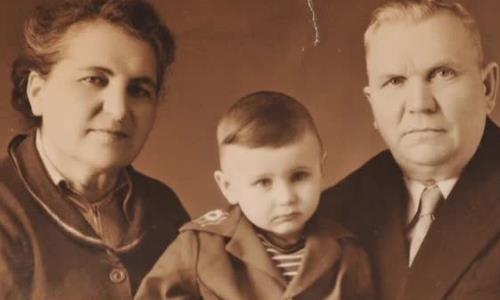
When instrumental music sounded from it, the kid ran as fast as he could to the black box and began to frantically conduct. Friends advised to send the child to a music club, and Zhenya’s mother brought him to the local pioneer house. Later he entered a music school, and subsequently a music school. Teachers always noted Zhenya’s unique natural hearing. But the boy’s parents couldn’t afford to buy an instrument, and at first he practiced on a paper keyboard - a layout from a piano tutorial. Of course, this slowed down his progress. But someone got involved, and the antediluvian black piano, gathering dust in the office of the local cultural department, moved into the Krylatovs’ room, taking up almost all the free space.
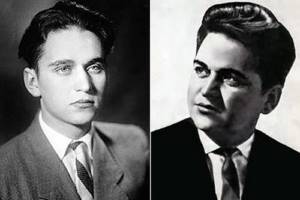
In 1953, Evgeniy went to Moscow to enter the conservatory. He failed the theory exam (he was simply not taught this in Perm), and yet was enrolled - thanks to the intercession of director Alexander Sveshnikov. Subsequently, in the life of a modest and completely incompetent young man, many times, literally out of nowhere, kind people appeared who helped him solve difficult problems and move forward.
At the Moscow State Conservatory, the future composer studied in two faculties at once: piano and composition. His graduation performance “The Seven-Flower Flower” turned out to be so good that the Bolshoi Theater took it into its repertoire.
Personal life
At the age of 23, Krylatov got married. He fell in love with the brown-eyed Seville, his friend's sister, at first sight. The newly-made family did not have their own corner: for a long time the couple wandered around with friends. Then they rented cheap rooms with stove heating, hiding from the police - neither Evgeniy nor Sevil had Moscow registration.
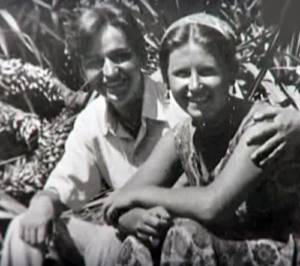
In 1965, daughter Maria was born. The young father of the family brought her from the maternity hospital to his own apartment, which the composer Tikhon Khrennikov procured for him. Evgeny Pavlovich recalled: when he and his wife first crossed the threshold of their own home, they sniffed the fresh wallpaper and varnish on the parquet with delight. They didn’t have furniture, so they laid a newspaper on the floor and slept like that, happy...
short biography
- 1953 - Evgeny Krylatov graduated from school and, thanks to his ingenuity and his talent, on the recommendations of his teachers, he entered the Moscow Conservatory.
- 1953-1959 - time of study at the Moscow State Conservatory. P.I. Tchaikovsky. The composer studied in classes with Vladimir Natanson (piano) and Mikhail Chulaka (composition). At first they did not want to take the young man to study, because the young man had absolutely no theoretical knowledge and did not pass the theory. However, the director of the conservatory, Alexander Sveshnikov, saw potential in the young man and accepted him.
- 1957 - Evgeny Krylatov married Sevili Karamanova, who was considered the first beauty.
- 1958 - this year the couple had a son, Pavel, whom Evgeniy and Sevil immediately gave to his grandmother, Evgeniy’s mother. Young parents wandered around rented, uncomfortable apartments, where heating was done with wood, so they could not constantly take their little son with them, exposing him to constant colds.
- 1959 is the last year of Yevgeny Krylatov’s studies at the conservatory. This year, the young composer’s graduation works were “Pamir Capriccio”, a piano concerto, and the ballet “The Flower of Seven Flowers”. Evgeniy defended his essays excellently.
- The beginning of the 1960s - at this time the composer began writing music for documentaries. As the composer himself puts it, “music can either make a film very boring or lift it to heights.” As a rule, Krylatov's music made films exclusively better rather than worse.
- 1961 - this year Evgeny Krylatov wrote music for the films “Quite Seriously” and “Life from the First.”
- 1965 - this year the Bolshoi Theater began to use the composition “The Flower of Seven Flowers” for performances, and for 5 years they used this work.
- 1965 - young parents are expecting their second child. In the same year, Tikhon Khrennikov made a very good gift - he gave the Krylatov family an apartment in the capital of Russia.
- 1970 - Evgeny Krylatov successfully begins working in the film industry. His works became very popular. The first films that were endowed with Krylatov’s music: “My Dad is a Captain”; "About love"; "Nomadic Front"; "Property of the Republic"; "Looking for a man"; “Oh, this Nastya.”
- 1971 - this year became a breakthrough in the field of cinema for the musician. Evgeny Krylatov wrote: “Winged swing”, “Forest deer”, “Three white horses”, “Snowflake”.
- 1982 - the composer became a laureate of the USSR State Prize in the field of culture and art.
- 1984 - Krylatov was awarded the Lenin Komsomol Prize.
- 1994 - Evgeny Krylatov was declared People's Artist of the Russian Federation.
- 2004 - the talented composer was awarded the title “Honorary Citizen of the Perm Region”.
- 2014 - The composer was awarded the Presidential Prize of the Russian Federation for achievements in the field of art.
- 2014 - Sevil Krylatova, the wife of the great composer, died, before reaching her sixtieth anniversary of marriage.
- May 8, 2019 - died at the age of 85, leaving a huge mark on history.
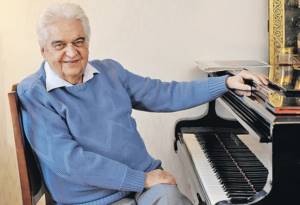
Music, songs
After graduating from the conservatory, the composer wrote music for theatrical productions. He was poor as a church mouse, and he had to feed his family. In those days, a composer could earn money only in two ways: playing in a restaurant or composing music for films. Pride prevented Evgeny Pavlovich from taking the first path, and he was unable to break into the film industry. As always, his good friend, composer Alexander Zatsepin, who was extremely in demand at that time, helped his dream come true.
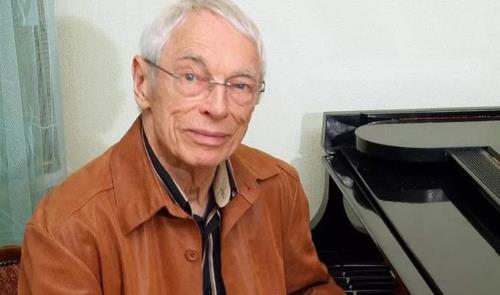
Then he took Krylatov by the hand and led him to the directors of the cartoon. They were unhappy. But when the composer sat down at the piano and played “Kneading the snow with a spoon...”, the anger was replaced with mercy. Eight minutes of music from “Umka” brought Evgeny Pavlovich all-Union fame. At that time he was already well over thirty, so the composer said to himself that he had jumped on the bandwagon of a departing tram.
Krylatov wrote music for many cartoons (including the Prostokvashino trilogy) and children's films (Guest from the Future, The Adventures of Electronics), but was always offended when he was called a children's composer.
In the Soviet film industry, the musician was never “one of the people,” but they turned to him again and again, especially when a song was needed “yesterday.” Evgeniy Pavlovich never argued, did not stick out his “I”, but knew how to find a compromise: “Nobody asked me if I had time, inspiration, how I felt. Necessary means necessary. I sat down at the piano and worked.”
The musician wrote exclusively on ready-made poems, but if they did not fit, then even such eminent poets as Yevgeny Yevtushenko changed the text “to suit Krylatov.” Once, a few days before the New Year holidays, the director of the film “Property of the Republic” (1972) turned to Yuri Entin with a request to write the lyrics of a song. The poet completed it in two days, and wrote the music in just an hour.
However, the capricious Andrei Mironov, who was to perform the piece in front of the cameras, criticized the music, demanding a waltz in the middle. Krylatov sat down and started from scratch - together the trio (Krylatov, Entin and Mironov) created “Song about the Sword” (“Whack, whack, whack, who’s new?”), which instantly became a hit.
But with the song “Forest Deer” from the film “Oh, this Nastya!” (1972) everything was different. Entin was urgently asked to write poetry about a panther, but he ended up with a deer. The Arts Council did not accept this option, and only when Krylatov played the melody did they exclaim in unison: “Great song!”
And yet many of his works had a difficult fate. Sergei Lapin, chairman of the State Committee for Radio and Television Broadcasting, thought the song “Forest Deer” was gypsy, and then its performer Aida Vedishcheva fell into disgrace. The song was banned for 10 long years, until Lyudmila Senchina gave it a second life.
And the famous “Winged Swing” from “The Adventures of Electronics” (1979) was called “crap” by director Konstantin Bromberg. He even stopped communicating with the composer, and he was upset that he had let his friend down. Only many years later, Evgeniy Pavlovich called the emigrated Bromberg in the USA and said: “Your dream has come true - “Winged Swings” are sung everywhere, even in restaurants!”
As a result, Bromberg entrusted the music for his film “Sorcerers” (1982) only to Krylatov. By the way, it was he who persuaded Alexander Abdulov, who did not have good vocal abilities, to perform one of the most lyrical songs in this film, as he later convinced even the “non-singing” Oleg Tabakov to sing in the cartoon “Winter in Prostokvashino” (1984).
It is interesting that his song-prayer “Beautiful is Far Away” for the ending of the film “Guest from the Future” (1985) was originally performed by a teenage girl. Krylatov was dissatisfied: “You can’t do that - it’s not a child who should sing!” I called my friend, singer Tatyana Daskovskaya: “Take a taxi and come!” There were 20 minutes left before the recording studio closed. The composition was recorded in the first take.
Time put everything in its place: the author of the music achieved the recognition of his colleagues and the love of his fans, and received the title of People's Artist. But he continued to remain the same modest and quiet person. Already in old age, Evgeniy Pavlovich had fun like this: when the tellers at the bank or at the post office looked at his passport, he wondered if his name told them something. They shook their heads negatively, and the composer began to list his songs - as it turned out, the girls-operators’ favorite ones from childhood. This made him happy...
Krylatov, Evgeniy Pavlovich
Evgeny Krylatov, Irina Dubtsova and Sergey Lazarev in the jury of the Children's New Wave 2016
| This section is missing references to information sources. Information must be verifiable, otherwise it may be questioned and deleted. You can |
Evgeny Krylatov created a large number of compositions in different genres: symphonic, chamber, pop music, music for drama theatre, radio and television. But his work in cinema was especially fruitful.
The beginning of his wide fame as a composer was the music for the animated films “Umka” (1969, directors V. Popov and V. Pekar) with the famous “Lullaby of the Bear” and “Father Frost and Summer” (director V. Karavaev); films “About Love” (1970, director M. Bogin), “Property of the Republic” (1971, director V. S. Bychkova), “Oh, this Nastya!” (1971, director Yu. S. Pobedonostsev). Since then, Krylatov has been one of the most sought-after composers of Soviet and Russian cinema for 25 years, writing music for feature films: “And then I said no...” (1973, director P. O. Arsenov), “Looking for a Man” (1973 , director M. Bogin), “The Woodpecker Doesn’t Have a Headache” (1974, director D. K. Asanova), “Confusion of Feelings” (1977, director P. O. Arsenov), “And That’s All About Him” (1977, director I. Shatrov), “Don’t part with your loved ones” (1979, director P. O. Arsenov), “The Adventures of Electronics” (1979, director K. Bromberg), “Guest from the Future” (1985, director P. O. Arsenov ), “The Purple Ball” (1987, director P. O. Arsenov), “Don’t Leave” (1989, director L. A. Nechaev), “When they are late for the registry office...” (1991, director - Vitaly Makarov), “First bridge" (1995, director R. Puya), "Children of Monday" (1997, director A. I. Surikova), the animated trilogy "Prostokvashino" (director V. Popov) and many others. Krylatov is the author of music for more than 140 films - documentaries, feature films and animated films. In addition to well-known films, Krylatov’s creative baggage includes paintings that are especially dear to the composer. Among them is the Soviet-Bulgarian feature film “The Little Mermaid,” filmed in 1976 by director Vladimir Bychkov.
All the popular songs came from cinema. The success of “Song of the Sword”, performed by Andrei Mironov in the film “Property of the Republic”, was continued by “Forest Deer” from the film “Oh, That Nastya!”, “Alder Earring” (“And That’s All About Him”), “Winged Swing” (“Adventures of Electronics”), “Three White Horses” (“Sorcerers”), “Beautiful Far Away” (“Guest from the Future”). The composer’s best works are collected on the discs “Winged Swing” (1994), “I Love You” (1996), “Sorcerers and Others” (2001), “Forest Deer and Others” (2003), “Guest from the Future and Others...” ( 2003), “Alder Earring” (2003), “Beautiful Far (2)” (2003), “World Music History” (2006), “Grand Collection” (2010), and others.
The television series “And That’s All About Him” is the first collaboration between Evgeny Krylatov and the poet Evgeny Yevtushenko. In addition to Yevtushenko, Krylatov collaborated with many famous poets - Bella Akhmadulina, Robert Rozhdestvensky, Leonid Derbenev, Igor Shaferan, Ilya Reznik, Mikhail Plyatskovsky. More than 70 songs have been written with Yuri Entin. Among the songs written by the composer are the children's prayer “Lord, have mercy!”, “Save and preserve” (words by A. Sukhanova).
The composer wrote music for the films “The Cricket Behind the Hearth” (director L. A. Nechaev, lyrics by Yu. S. Entin), “Under the Polar Star I”, “Under the Polar Star II” (director M. Voronkov, lyrics by E. Yevtushenko), “Collective Farm Entertainment” (directed by M. Voronkov), “Little Fighter”, “Zorka Venera” (Star Venus), “Ball Gown (Dress for Cinderella)” (all directed by M. Kasymova), “Thumbelina” ( director L. A. Nechaev, lyrics by Yu. S. Entin), songs “Be with me”, “In the old castle” (lyrics by Yu. S. Entin). Music for the children's educational television film "Gardener 2" (2009, director A. Samsonov), the television series "Annushka" (2009, director Sergei Nikonenko).

